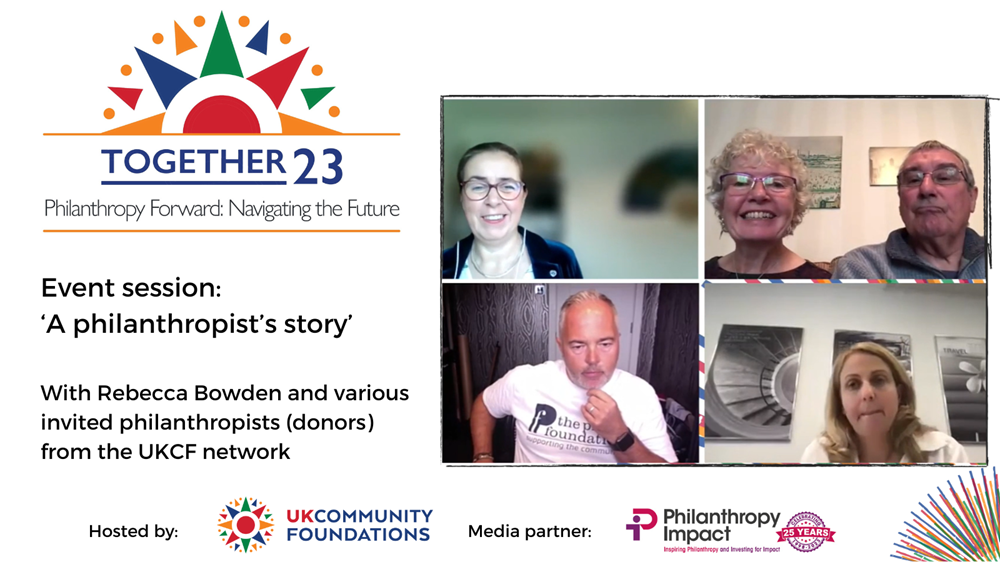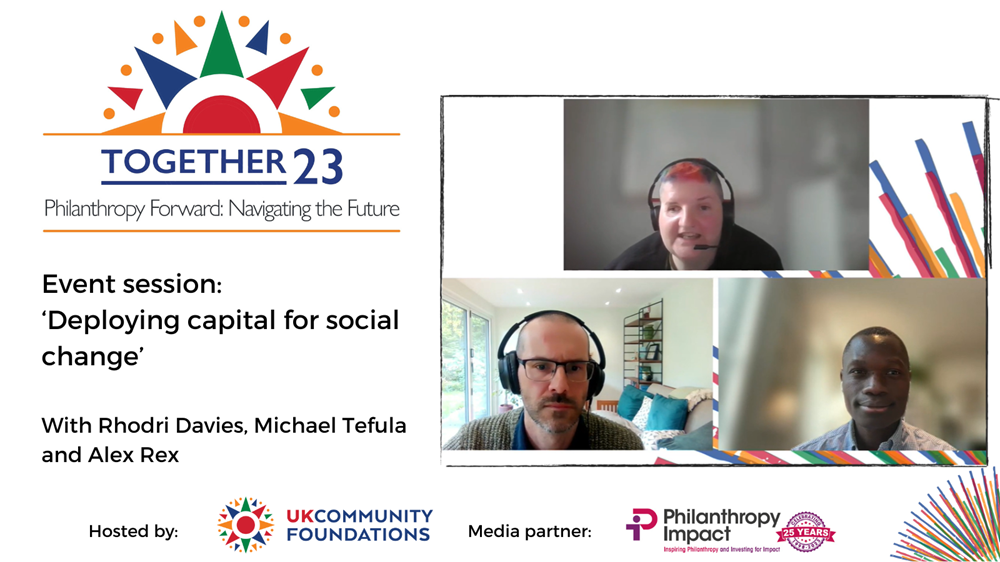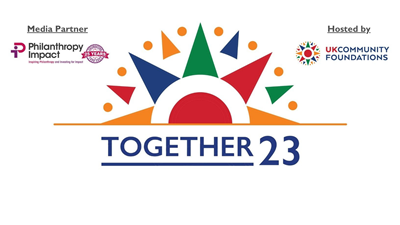Why is the word “philanthropy” so loaded and what, if any, alternative terms can we use? How do we incentivise giving without preaching? And how do we share more power? These were just a few of the questions and challenges sparked for the Devon Community Foundation staff team during the UKCF Together 23 conference.
The conference provided Devon Community Foundation with a welcome opportunity to pause briefly from our day-to-day work and reflect on some bigger questions about how and why we do what we do. It came at a particularly apt time for us as we have strengthened our core staff capacity and are working towards renewing and relaunching our strategic framework and brand in 2024.
So, although we were not able to get together in person to watch the conference we did gather on Teams, along with our chair Dinah Cox, to share some lively discussion as the sessions unfolded.
The Welcome and Keynote: ‘In Defence of Philanthropy’ affirmed our increased focus on inequality and climate change and how we want to position giving to a community foundation such as ourselves as being a direct way to counter common criticisms of philanthropy. We were left with some questions about how far some wealthy people are incentivised to support systemic change, but we accepted the call to action to do philanthropy differently and agreed that we have a vital role to play in that.
‘A Philanthropist’s Story’ got us musing on the word philanthropy – it was interesting although not a huge surprise to us to hear that the panel members did not like to use that word to refer to themselves. We wondered when a donor becomes a philanthropist, and discussed the fact that you don’t need to be wealthy to give.

Almost everyone has something they can offer, whether it’s time or resources. But if people don’t like the word philanthropy, we have to be careful about how we engage with people’s desire to do good – whatever their capacity to give – and avoid preaching at them or alienating them by using opaque “charity speak”.
Plain English and listening are key here. We liked the “acorn fund” idea and how this could be used to engage people of all ages and from all backgrounds. This is an area we are keen to explore more.
During the talk on ‘Transforming Philanthropy’, we agreed that we have a role as convenors and in building community. However, we noted that convening without resources is not a particularly appealing prospect, and that building good collaboration and partnerships takes time and money. This links back to the discussion we so often have about the need to fund “backroom” work and not just give grants for projects.
We also talked about the need to share power and build a shared vision through the co-production of grant programmes, and how we are currently trying to put this into practice initially through our Community Grants and Devon on Earth grant scheme, and our funding for youth mental health and longer term across all our programmes. On a national level, we discussed how large funders, both family and public, can shift power by resourcing place-based funds to community foundation programmes.
The panel discussion on ‘Deploying Capital for Social Change’ reignited these questions about how we ensure philanthropy works with our communities, rather than doing to them, and how we also get funds to “unpopular” causes that our donors might deem “less deserving”.

We reflected on loans versus grants, feeling that, while investment may work for certain types of charities, it is not necessarily the answer for the community sector, particularly the smaller local organisations that we support. This brought us back to the need for longer-term, unrestricted grants.
The ‘Value and Need for Philanthropic Advice’ session reaffirmed our belief that we need to be confident about guiding donors so that their giving supports the needs that we at DCF have identified as priorities for our communities. Our research and insight in key areas such as health inequalities, economic inequalities and the environment will play an important role in building that confidence and trust in DCF as the go-to platform for insight and impact in Devon.
As DCF moves into a new chapter we are excited about the role modern philanthropy has to play in tackling social inequality and helping to build thriving, equitable communities. No doubt many of the discussions sparked over the course of the two days will continue within our team and we also look forward to continuing them with our colleagues across the UKCF network and the wider sector.
Discover more

Together 23 conference reflections

Legacy: gifting tomorrow

SDGs: The value of local collaboration

Strengthening refugee support at a local level
UK Community Foundations is a registered charity in England and Wales. Registered company in England and Wales . Registered address: UK Community Foundations, Northgate Business Centre, 38-40 Northgate, Newark, NG24 1EZ. Registered company no. 2651777 | Registered charity no. 1004630. Copyright © 2021 All rights reserved.

